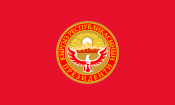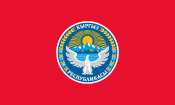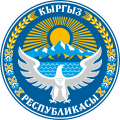Flag of Kyrgyzstan
 | |
| Use | National flag and ensign |
|---|---|
| Proportion | 3:5 |
| Adopted | 3 March 1992 (first introduction) 26 December 2023 (current version) |
| Design | A red field charged with a yellow sun with forty uniformly spaced rays, representing the forty clans united in legend by Manas; the sun is crossed by two sets of four lines, representing the traditional Kyrgyz yurt. |
 | |
| Use | Presidential Standard |
| Proportion | 3:5 |
| Design | A red field charged with the emblem of the president of Kyrgyzstan in the centre |
 | |
| Use | Local government flag |
| Proportion | 3:5 |
| Adopted | Since 2017 |
| Design | A red field charged with the national emblem in the center, used by local governments in Kyrgyzstan |
The State Flag of the Kyrgyz Republic[a] consists of a red field charged with a yellow sun that contains a depiction of a tunduk, the opening in the center of the roof of a yurt (traditional nomadic tent). Adopted in 1992, just over seven months after the country's independence was declared, to replace the flag of the Kirghiz Soviet Socialist Republic, it has been the flag of Kyrgyzstan since that year. The red on the flag is said to be inspired by the pennant lifted by Manas, the country's folk hero.
History
[edit]
Kyrgyz rebels wielded white banners (named "White Banner of National Liberation") during the Andijan uprising of 1898.[1] Later, during the Central Asian revolt of 1916, they used it again during an uprising in Jizzakh[1] and during an attack on Prebechakenska.[2]
Under Soviet rule, the Union Republic — coterminous with modern-day Kyrgyzstan — utilized a flag derived from the flag of the Soviet Union and representing Communism, that was adopted in 1953.[3] It declared itself independent on 31 August 1991, approximately four months before the dissolution of the Soviet Union.[4] Nevertheless, the Soviet-era flag maintained its status as the national flag for seven months after independence was declared.[3] It was finally replaced by new design on 3 March 1992, one day after Kyrgyzstan was admitted to the United Nations along with seven other post-Soviet states.[3][5]

In late 2023, a debate was led in the Zhogorku Kengesh (parliament of Kyrgyzstan) to straighten the wavy sun rays due to its supposed similarity to a sunflower,[6][7] which in Kyrgyz culture can signify "a fickle and servile person willing to switch allegiance for personal benefit". The bill passed its first reading on 29 November, and second and third readings on 20 December.[8][9] The bill was signed into law by President Sadyr Japarov on 22 December.[10] The law was officially published on 26 December and came into force on the same day.[11]
Chronology
[edit]| Flag | Date | Use | Description |
|---|---|---|---|
| Soviet Union (1926–1991) | |||
 |
1929–1937 | Flag used during the Kirghiz Autonomous Socialist Soviet Republic | Possible red flag with the hammer and sickle and bilingual initials for Kirghiz ASSR in the canton, however it likely was never official.[12] |
  |
1936–1940 | Version without hammer and sickle. | |
 |
1940–1952 | Flag used during the Kyrgyz Soviet Socialist Republic | A red flag with the hammer and sickle and bilingual initials for Kirgyz SSR in the canton. |
 |
1952–1991 | A red flag with a gold-bordered red star, hammer and sickle in the canton, and two navy blue bars and a white stripe in the middle. | |
| Kyrgyz Republic (1991–present) | |||
 |
1991–1992 | The flag of the Kyrgyz SSR remained in use for a year. | A red flag with a gold-bordered red star, hammer and sickle in the canton, and two navy blue bars and a white stripe in the middle. |
 |
1992–2023 | National flag of the Kyrgyz Republic | A yellow sun with a traditional Kyrgyz yurt motif in its center on a red field. |
 |
2023–present | The sun's rays were straightened to reduce its supposed resemblance to a sunflower.
The number of holes in the lattice in the center of the flag has also been increased | |
Design
[edit]Symbolism
[edit]

The colors and symbols of the flag carry cultural, political, and regional meanings. The red field stands for "bravery and valor",[4] and alludes to the purported emblem hoisted by Manas, the national hero of Kyrgyzstan.[3][13] The sun epitomizes peace and prosperity,[4] while its 40 rays stand for the number of tribes united by Manas to fight against the Mongols,[13][14] as well as the number of followers he had.[3][5]
The centre of the sun features a stylized illustration of the roof (tunduk) atop a traditional Kyrgyz tent (yurt) when viewed from the interior.[3][5][15] Although these tents are less commonly used today,[3] its incorporation into the flag is meant to symbolize the "origin of life", the "unity of time and space", as well as the people's "hearth and home" and their history.[3][5]
Proposals for change
[edit]In late 2023, a debate was led in the Zhogorku Kengesh (parliament of Kyrgyzstan) to straighten the wavy sun rays due to its supposed similarity to a sunflower,[16][17] which in Kyrgyz culture can signify "a fickle and servile person willing to switch allegiance for personal benefit". The bill passed its first reading on 29 November, and second and third readings on 20 December.[18][19] The bill was signed into law by President Sadyr Japarov on 22 December.[10] The law was officially published on 26 December and came into force on the same day.[11]
The red field has also been the source of much criticism. Some believe that it evokes the nation's tempestuous history, while others are of the opinion that it is a lingering remnant of communism in the country.[20]
Color scheme
[edit]| Colors scheme | Red | Yellow |
|---|---|---|
| Pantone | 1788 C | Yellow C |
| CMYK | 0, 100, 100, 0 | 0, 0, 100, 0 |
| HEX | #FF0000 | #FFFF00 |
| RGB | 255, 0, 0 | 255, 255, 0 |
Regional flags
[edit]Each region (областы, oblasty or облусу, oblusu) of Kyrgyzstan has its own flag.
-
Bishkek (independent city)
City flags
[edit]-
Bishkek (city with region status)
Other flags
[edit]-
Flag of Kyrgyzstan Border Service (obverse)
-
Flag of Kyrgyzstan Border Service (reverse)
-
Flag of Kyrgyz Armed Forces (Kyrgyz)
-
Flag of Kyrgyz Armed Forces (Russian)
See also
[edit]Notes
[edit]References
[edit]- ^ a b Sokol, Edward Dennis (2016). The Revolt of 1916 in Russian Central Asia. JHU Press. p. 92. ISBN 9781421420509.
- ^ Archived at Ghostarchive and the Wayback Machine: "Semirechye on Fire (Timestamp 17:58)". RT. Retrieved 2018-11-20.
- ^ a b c d e f g h Smith, Whitney (February 9, 2001). "Flag of Kyrgyzstan". Encyclopedia Britannica. Encyclopedia Britannica, Inc. Retrieved March 23, 2017.
- ^ a b c "Kyrgyzstan". The World Factbook. CIA. Retrieved March 23, 2017.
- ^ a b c d Kindersley, Dorling (November 3, 2008). Complete Flags of the World. Dorling Kindersley Ltd. p. 194. ISBN 9781405338615. Retrieved March 23, 2017.
- ^ "Спикер Жогорку Кенеша заявил, что флаг Кыргызстана будет изменен" [Speaker of Zhogorku Kengesh said that the flag of Kyrgyzstan will be changed]. Радио Азаттык (Кыргызская служба Радио Свободная Европа/Радио Свобода) (in Russian). 2023-10-31. Retrieved 2023-10-31.
- ^ "Три варианта. Что хотят изменить во флаге Кыргызстана?" [Three options. What do they want to change in the flag of Kyrgyzstan?]. Радио Азаттык (Кыргызская служба Радио Свободная Европа/Радио Свобода) (in Russian). 2023-10-26. Retrieved 2023-10-31.
- ^ "Kyrgyzstan moves to rid national flag of likeness to 'fickle' sunflower". Reuters. 2023-11-29. Retrieved 2023-11-29.
- ^ "Парламент Киргизии одобрил изменение солнца на государственном флаге". Коммерсантъ (in Russian). 2023-12-20. Retrieved 2023-12-20.
- ^ a b "President signs law on new flag of Kyrgyzstan". 24.kg. 23 December 2023. Retrieved 26 December 2023.
- ^ a b "Закон об изменении флага вступил в силу в Кыргызстане". Kazinform (in Russian). 26 December 2023. Retrieved 26 December 2023.
- ^ "Kyrgyzstan in the Soviet Union (early flags)". www.crwflags.com. Retrieved 2024-10-17.
- ^ a b World and Its Peoples, Volume 1. Marshall Cavendish. September 1, 2006. p. 629. ISBN 9780761475712. Retrieved March 23, 2017.
- ^ Omelicheva, Mariya Y., ed. (December 17, 2014). Nationalism and Identity Construction in Central Asia: Dimensions, Dynamics, and Directions. Lexington Books. p. xviii. ISBN 9780739181355. Retrieved March 23, 2017.
- ^ Peoples of Western Asia. Marshall Cavendish. September 1, 2006. p. 254. ISBN 9780761476771. Retrieved March 23, 2017.
- ^ "Спикер Жогорку Кенеша заявил, что флаг Кыргызстана будет изменен" [Speaker of Zhogorku Kengesh said that the flag of Kyrgyzstan will be changed]. Радио Азаттык (Кыргызская служба Радио Свободная Европа/Радио Свобода) (in Russian). 2023-10-31. Retrieved 2023-10-31.
- ^ "Три варианта. Что хотят изменить во флаге Кыргызстана?" [Three options. What do they want to change in the flag of Kyrgyzstan?]. Радио Азаттык (Кыргызская служба Радио Свободная Европа/Радио Свобода) (in Russian). 2023-10-26. Retrieved 2023-10-31.
- ^ "Kyrgyzstan moves to rid national flag of likeness to 'fickle' sunflower". Reuters. 2023-11-29. Retrieved 2023-11-29.
- ^ "Парламент Киргизии одобрил изменение солнца на государственном флаге". Коммерсантъ (in Russian). 2023-12-20. Retrieved 2023-12-20.
- ^ Namatbaeva, Tolkun (9 March 2012). "Fight rages over Kyrgyzstan's flag". The Washington Times. Archived from the original on 13 July 2023. Retrieved 20 December 2023.


















